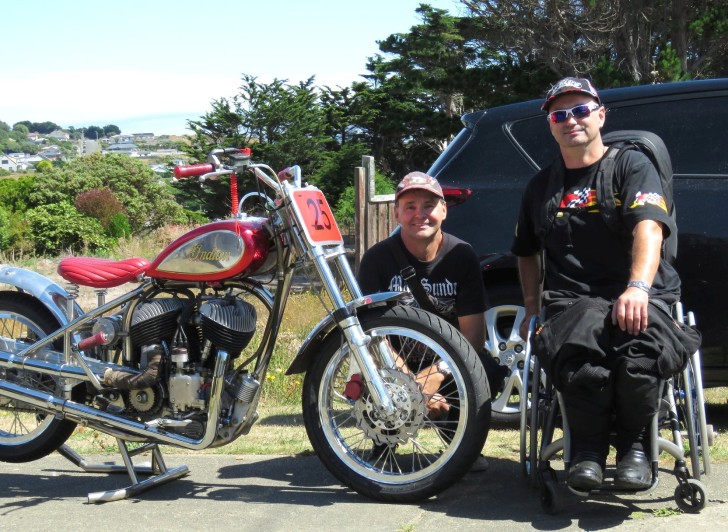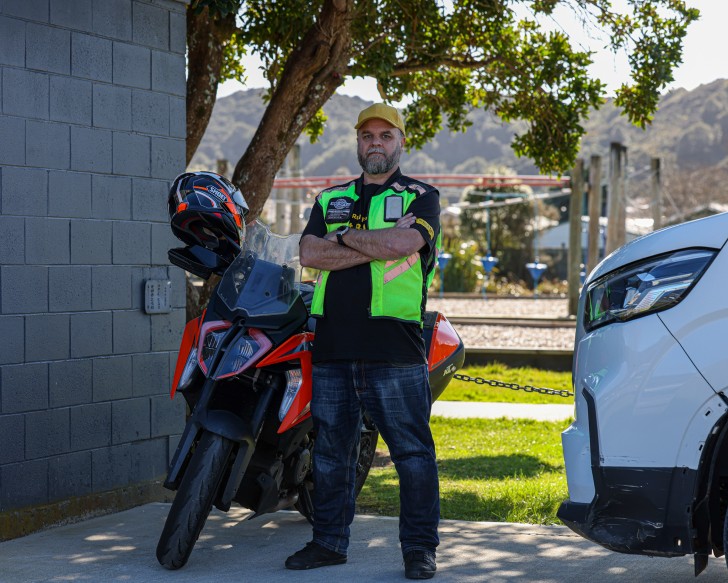Brett’s story: Finding a moment of hope
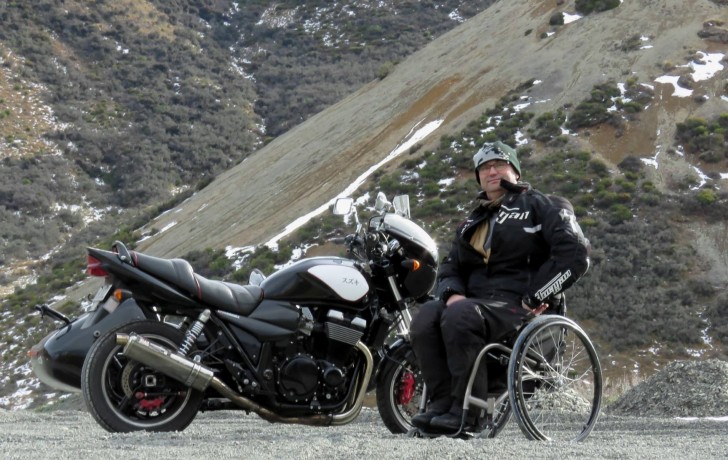
After sustaining a spinal injury 40 years ago in a motorbike accident, Brett Ladbrook is now supporting others who’ve also suffered a life-changing injury. He’s sharing his story as part of Motorcycle Awareness Month to promote road safety.
Brett Ladbrook is more focused on what he can do than what he can’t.
“If you put your mind to it, you can do anything,” he says.
“Life doesn’t stop after a spinal injury.”
It’s been 40 years since Brett crashed his motorcycle in Ponsonby, an inner-city suburb of Auckland. He was 16 in 1985, and the accident left him with a spinal injury and unable to walk.
His memories of the day his life changed forever are hazy.
Originally from Invercargill, Brett was working in Ponsonby and looking at an apprentice mechanic job.
He was riding his motorbike down a side street when a truck came over the centreline and he swerved to dodge it.
“I’ve got a blank space for 20 minutes where I can’t remember anything,” the 56-year-old says.
His first memory of the accident was lying in an ambulance and being told he’d been in a serious crash. He was travelling around 50km per hour when he slid along the road and smashed into the curb, with his back taking the full impact.
“Apparently, I sat up after the accident, which didn’t help the injury to my spine. I was in a lot of pain, and I remember swearing my head off in the ambulance. I was in total shock.”
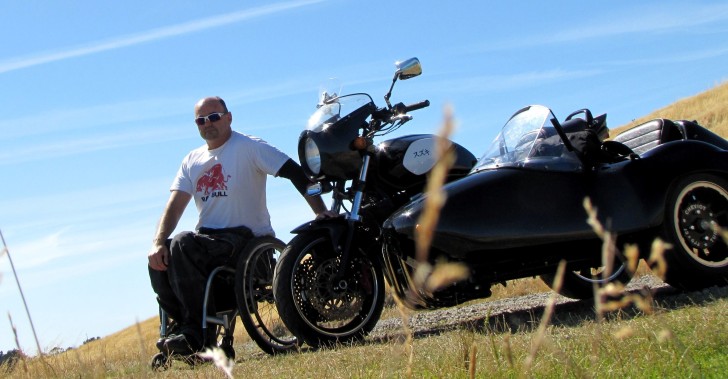
‘It was hard to take in at 16’
Brett spent three days in Auckland Hospital. He was advised by doctors that he’d sustained a spinal injury and would never walk again.
“It was a pretty devastating moment and hard to take in at 16,” he says.
He was then transferred to the Auckland Spinal Unit in Otara where he started his new life. Brett and his whanau opted not to have corrective surgery and had six weeks of bed rest.
He spent another six weeks in the spinal unit rehabbing and the biggest impact on him was those around him living full lives with a spinal cord impairment.
“It was pretty tough going as you come to terms with the consequences of that moment,” he says.
“But seeing other guys that had been using chairs for a while, they were getting on with their lives working, playing sport, driving cars and just enjoying themselves. It was like a light at the end of the tunnel, a moment of hope.”
Brett immediately thought about his passion – motorbikes.
He wanted to work out a way to get back on the bike. He managed to do it in less than a year.
He says the support of ACC was a constant pillar throughout his rehabilitation.
“I don’t know what I would have done without their support. They’ve been there to help me get back to working and a life of independence.”
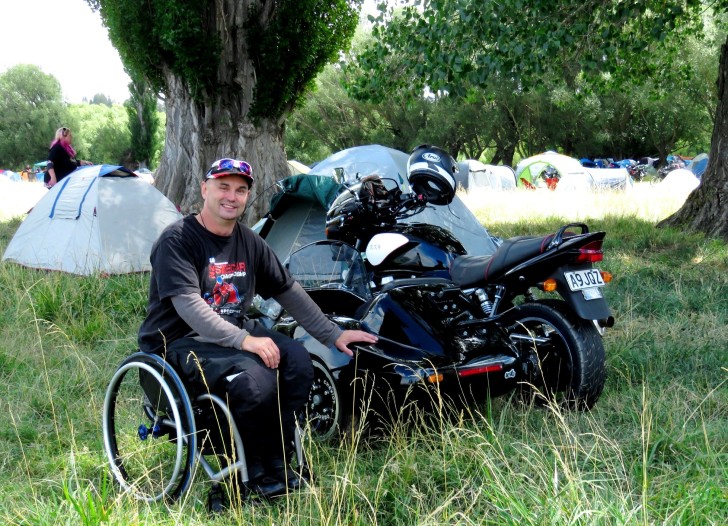
‘I pinch myself that I’m still riding’
He says there’s nothing like the feeling of riding on the open road.
“It’s full freedom,” he says.
“There are so many things I love about riding – the challenge of riding in all sorts of weather and the different roads, the sensory things you're taking in and the community. The people are awesome.
“I pinch myself that I’m still riding on a bike. It’s got three wheels, so it’s a different challenge to riding a two-wheel bike. They’re tricky occasionally, but it has a sidecar where I can put my wheelchair.”
Brett attends annual motorcycle events like the Burt Munro Challenge in Bluff, and he always gets lots of questions about being a wheelchair user and motorbike rider.
“People are intrigued I guess, but their interest is always genuine and supportive,” he says.
“Being able to ride and go on big trips, which are eight-hour rides, has given me a lot of enjoyment.”
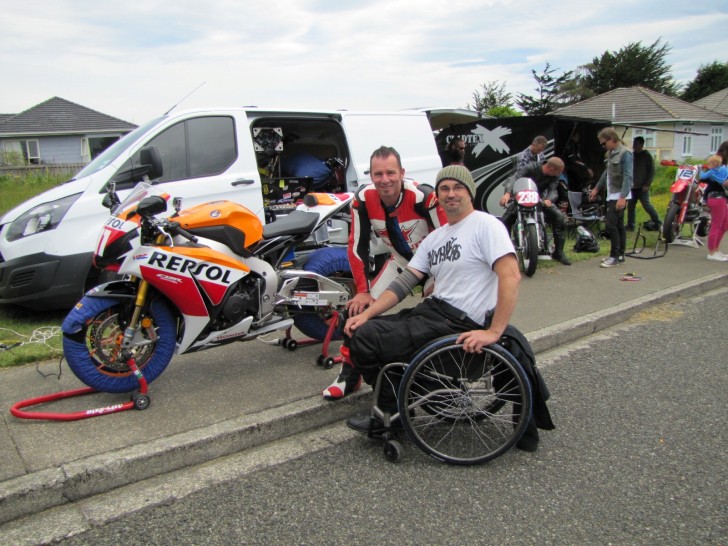
Getting road ready to Ride Forever
Brett knows he’s far from alone in his passion for motorcycles but also in suffering an accident on the road.
In 2024, ACC accepted 4,739 motorbike-related injuries at a cost of $150 million to help people recover.
This was the highest number of injuries and the highest cost in the past five years. The active claims cost was $109 million in 2020.
Brett says too many Kiwis ‘wing it’ when the conditions improve at this time of year and they get back on their bikes.
“You’ve got to be ready,” he says.
“Check the condition of your bike, your tyre pressure. I always give my bike a good wash, that’s usually where you notice a nut loose or something’s a bit wobbly. Make sure your gear is in good condition and do some training to refresh your skills.”
ACC injury prevention leader James Whitaker says spring is the perfect time to be thinking about riding your motorbike safely.
Every year around 50 per cent of motorbike riders de-register and put their bikes away over the winter months, then bring them back out in spring.
“As we come into September, it’s a great time of year and we want motorbike riders to celebrate their love of riding and get back on the open road,” he says.
“But, as you get back on the bike, make sure you’re ready to get the most out of your time. We recommend all riders complete a Ride Forever coaching programme.”
ACC data shows riders who’ve completed a Ride Forever course are up to 50 per cent less likely to lodge a motorcycle-related accident claim than non-trained riders.
Finding hope after a life-changing injury
As someone who’s had his life changed from an accident, Brett loves helping others find their ‘moment of hope’.
He works at the New Zealand Spinal Trust as a peer support worker and has good advice for others at the start of their journey.
“Never give up,” he says.
“Give yourself time, time for your body to heal, get fit again and for your mind to get around it. If there's something you want to do, someone else has already done it before.
“A life-changing accident like this makes you think outside the square. So you look at things differently but you can still have a great life.”
Motorcycle Awareness Month
This Motorcycle Awareness Month, get ready for your ride by doing these three things:
- Check your bikes are well-maintained
- Ensure your gear is up to scratch
- Refresh your skills by completing a Ride Forever coaching programme
For more information visit the Ride Forever website.




